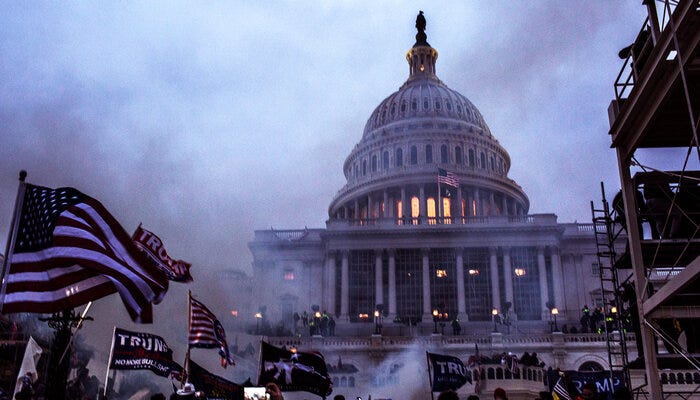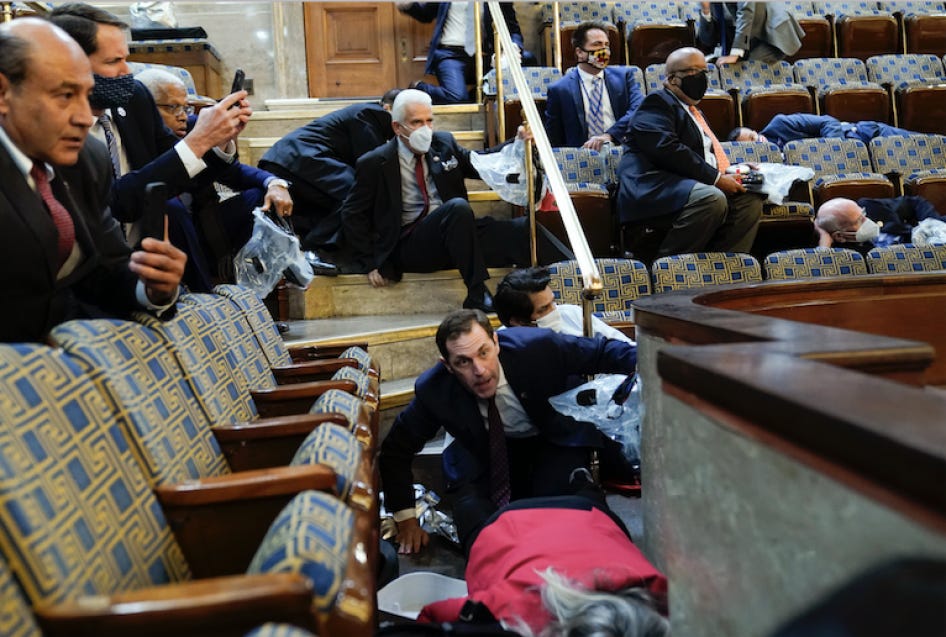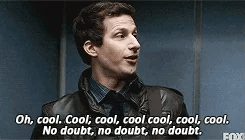This is why the world feels so unsettling right now
Welcome to ‘hypernormalisation’.
An audio version of this article (narrated by me) is below:
A reel popped into my Instagram feed earlier this week that made me feel simultaneously terrified, depressed and relieved. In it, digital anthropologist Rahaf Harfoush explains why the world feels so ‘off’ to so many of us: ‘hypernormalisation’. Her explanation struck such a chord that I immediately watched the Adam Curtis 2016 BBC documentary of the same name and then promptly started this article. If you, like me, also feel as if the world has lost its teeny tiny mind and that we’re all stuck in a general malaise, then this theory may help to reassure you that a) you’re not alone and b) you’re not crazy.
So, deep breath, let’s get into it…
What is ‘hypernormalisation’?
‘Hypernormalisation’ is a state of being where everyone knows that the systems underpinning society are crumbling, yet pretend that they’re not.
The term was coined by Alexei Yurchak, a Russian professor of anthropology who wrote a book called, Everything Was Forever, Until It Was No More: The Last Soviet Generation (2006). In it, he describes how during the 1970s and ’80s, everyone in the Soviet Union knew that things were on the skids, but didn’t know what to do about it, so just acted as though it was fine. “Lalalala! Nothing to see here except great times!” Eventually, this ‘fake reality’ became the new normal – an effect Yurchak called ‘hypernormalisation’.
The documentary by Adam Curtis expands this theory into western culture, analysing how during the same time period, western governments and financial institutions didn’t know how to manage the complexity and nuances of a rapidly changing world and so…didn’t. Instead, they doubled-down on the status quo, a supposedly ‘stable’ world founded on ‘good guy’ versus ‘bad guy’ narratives. Multinational corporations quietly funded the whole charade. Politicians were replaced by businessmen and bankers who represented the richest and most powerful rather than giving a voice to civilians. (Please, please, please watch the documentary which details international fuck-ups that the world is still reeling from to this day, particularly with Syria, Israel, Iraq and Iran.)
All smells a bit familiar, no?
Ok, so what’s happening now?
Hundreds of examples of hypernormalisation have happened in the past month alone, across Europe and the US, involving wars, climate and culture (all of it has to do with politics so I’m not listing that as a separate topic). However, I am going to focus on just one of them here so I can do a proper deep-dive as I believe it ticks absolutely every single hypernormalisation box: Trump’s January 6 pardons.
Earlier this week, Trump pardoned more than 1,000 January 6 rioters, including 300 convicted of violent crimes, 69 who admitted assaulting police with a dangerous or deadly weapon, and several convicted of seditious conspiracy (forming a group to overthrow the government). Stewart Rhodes, the released former leader of the far-right Oath Keepers group, said, “It’s redemption, but also vindication.”
This act, from the leader of the Republican ‘law and order’ party, is unprecedented. It suggests that the insurrection was valid and, well, just not that big of a deal. Trump has downplayed the violence, calling them ‘minor incidents’, despite the fact that 140 police officers were assaulted and officer Brian Sicknick passed away a day later from two strokes attributed to the attacks. There are videos of some of these assaults. 170 people pleaded guilty to assaulting law enforcement. They admitted it! Then there’s how Trump constantly refers to the rioters as ‘hostages’ – a huge hypernormalisation red flag – suggesting that, let alone being aggressors, they are victims themselves – victims of an unjust and corrupt system. He has simultaneously said they’ve served enough time and also absolved them of any responsibility. Vindication indeed.
When asked whether these pardons may send the message that assaulting police officers is okay, Trump declared: “No, the opposite. I am a friend of the police, more than any president who’s ever been in this office”. Wait, what? How? Why? What does that mean in this context? It’s like reading the wrong subtitles on a news programme: “Wait, that can’t be right. That makes literally zero sense” and yet everyone else – i.e. Republicans – seem to be reading them just fine.
In this instance, it’s not just the batshit act itself that you’re expected to accept as normal – cool, cool, cool – it’s the inane justifications that Trump’s colleagues in the Republican party are desperately trying to pull out of their bums. After having previously said, “If you committed violence on that day, obviously you shouldn't be pardoned,” Vice President JD Vance has been conspicuously silent. Hello, Vance? Coo-ee? Meanwhile, Republican Senate Majority Leader John Thune avoided the subject altogether ,saying, “We’re looking at the future, not the past”. Stay classy, Thune. House Speaker Mike Johnson burbled some nonsense about how he has no influence over Trump (but, like, shouldn’t he?) and at the end of the day isn’t Christianity all about redemption and second chances? Hard to square that, Mike, with the US being home to the largest number of prisoners worldwide.
When journalists have asked people on the street in vox pops whether this might embolden violent extremists – or even, whisper it, create a kind of far-right army in Trump’s name – they laugh. “Don’t be ridiculous! You’re going too far.” And yet, since being released both Stewart Rhodes and Enrique Tarrio, head of the Proud Boys, have said they’re going to regroup, vowing “vengeance” on anyone who has ‘wronged’ them.
Hey, everything seems fine until it’s not, right?
The only sane moment in this whole situation came from Pamela Hemphill who refused her pardon (she pleaded guilty and was sentenced to 60 days in prison for her role in the riots), saying, “We were wrong that day. Accepting a pardon would only insult the Capitol police officers, rule of law and, of course, our nation. I pleaded guilty because I was guilty, and accepting a pardon also would serve to contribute to their gaslighting and false narrative.”
Fucking yes, Pamela! Gaslighting is what it is! And it’s not going to stop. House Republicans have just formed a new panel to reinvestigate January 6 and “expose false narratives” about the attack. They want to clear Donald Trump of any responsibility, downplay the violence, and give credence to the conspiracy theories that federal agents were planted to ramp things up. THEY ARE LITERALLY ADMITTING THAT THEY ARE ABOUT TO REWRITE HISTORY.
Cool, cool, cool.
Perception management
Successful hypernormalisation is all about ‘perception management’ – how you spin stories to fit the ‘this is fine’ narrative. In the perception management toolbox lives whataboutism (responding to criticism with counter-criticism), the ‘dead cat strategy’ (drop a random bombshell to distract from a genuinely relevant bombshell), propaganda, control of the media (hello, recent US TikTok ban!), and anti-protest legislation (take a bow, Suella Braverman!). Then there’s the daddy of them all: gaslighting on a global scale.
When caught out, those needing to fudge reality will inform you that what you saw with your own eyes wasn’t actually what you saw at all. And, not only that, but the very fact that you thought you saw it is because of them over there trying to trick you.
Gaslighting involves sowing seeds of uncertainty and anxiety because when things feel unstable people are happier to eschew nuance in favour of a seemingly simple solution – one ‘villain’ that, when vanquished will solve the whole issue. (An issue which is, in reality, never black or white and always extremely complicated).
Thanks so much for supporting my work. If you enjoy what you read/listen to and would like to buy me a coffee, I would really appreciate it.
So, why aren’t we all rioting in the street?
Because we’re fucking exhausted.
Being constantly told that what you’re seeing isn’t real, isn’t actually happening, isn’t actually important, or doesn’t mean what you think it means, is isolating. Being constantly told that if you do speak up you’ll face legal, financial, social or violent repercussions is terrifying and exhausting. We are underpaid, overworked and feel powerless. The result of this can be the very human desire to follow the crowd and to quietly succumb to mob mentality or groupthink because it’s easier and, more importantly, less frightening.
Hypernormalisation covers up a drip, drip, drip of lies and skewed storytelling. A slow sprinkling of untruths and twisted tales that build on top of each other until you’re so far down the road of what-the-fuckery, you can’t remember where you started. Soon the fact that we have 1) more conflict, yet less diplomacy, 2) more attacks on civilians, yet less consequences, 3) more carbon emissions, yet less climate crisis action, 4) more wealth creation, yet less poverty alleviation – does seem, well, ‘normal’. (These four points are the main drivers of international crises as listed by The International Rescue Committee’s 2025 Emergency Watchlist.)
You can add to that how no one seems to be held accountable for anything: Arrest warrant for crimes against humanity? Ignore it! Outright lie to the public about what Brexit will mean? Win more seats at the latest election than ever before! Cause a global financial crash that destroys lives? Unlimited bonuses for you!
There’s a point where us normal folk think, “That’s just how it is.” A resignation and acceptance that whatever we may say or do, it has no effect. It changes nothing. We don’t trust ‘government’, but can offer up no alternative, so instead lose ourselves in lives lived online in a world driven by algorithms prioritising clicks rather than community or cohesion.
Is it any wonder that we’re not rioting in the streets?
Well, that was depressing. Thanks.
Still with me? I hope so! There is genuine hope here, I promise! The very fact that we’re talking about this – that Harfoush’s reel hit my newsfeed at all – means that people are searching for reassurance from each other and not from the new oligarchy. It’s a sign that perhaps what has happened in the past few years – or even just the past few days – is so outrageous that the hypernormalisation illusion is cracking. Important positive moments are happening: Pamela Hemphill flagging up the nonsense of the pardons is incredibly brave and astute, particularly given the people she’s turning away from. Bishop Mariann Budde’s face-to-face plea to Trump for mercy during her sermon was exhilarating and inspiring. Yes, she has since faced misogynistic abuse and death threats as well as Trump himself demanding an apology, but she is refusing to back down. May we all be as courageous.
Maybe we’re starting to believe our own eyes again. Maybe we’re not as worn down and exhausted as they assume. Maybe we haven’t all acquiesced to the status quo. Maybe we’ll remember the power of community action, of rebellion, of revolution. Maybe we’ll march again, not with the expectation of topping governments but just to feel alive. Just to feel like we’re doing something. Maybe revolutions are coming.
Will I start one? Shit, I dunno. I am pretty tired.
Just One More Thing
The looming TikTok ban is an important thing to monitor, regardless of any personal interest in the app. Trump has granted its owner, the Chinese company ByteDance, a 75-day extension so his administration can “determine the appropriate course of action”. He has floated the idea of a 50/50 sale with an American company… and guess who is rumoured to be interested? Yes, Elon Musk, he of ‘that definitely wasn’t a Nazi salute’ fame. If Musk buys TikTok then he, Zuckerberg and Sundar Pichai will own the top four social media platforms in the world with 10 billion monthly users. (That’s not even counting Twitter/X.) These three men, along with Jeff Bezos, were part of the ‘billionaires row’ behind Trump at his inauguration. For them to have total control of the world’s most-used news and communication sites would be an extraordinary capitulation to hypernormalisation. So, shall we all club together and make an offer? I have four quid and a dusty bag of drugs. Who’s in?
*My new book, Own Your Calm, is published in March 2026! Available across the US and Europe (in English), I’ve included the UK link here but please do check your local bookseller: Own Your Calm UK. I have written eight other (bestselling) mental-health books which have been translated into dozens of languages. I’ve also written a book about the TV show Friends which would make a delightful gift for any Friends obsessives. All are available to buy online or at your local bookshop.







Thank you for this💙
Thanks so much for writing this! I've been feeling like I keep missing a step but can't find it. Really helps explain what's going on. Friends at the peaceful climate march in Manchester, UK were assaulted today by the far right. So sad, and unthinkable even 2/3 years ago.
I started watching the documentary, which is terrifyingly truthful. Gonna watch a bit each day to manage it